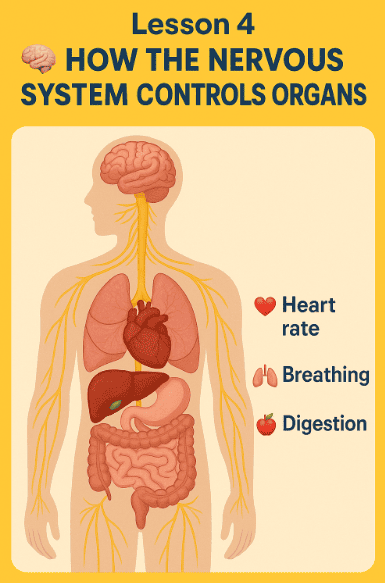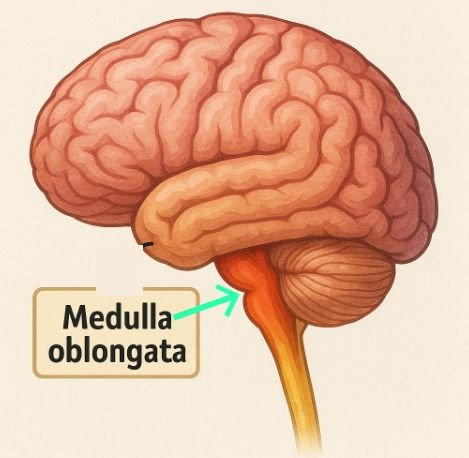
🌟 Quick Recap from Last Time
In our last lesson, we explored the autonomic nervous system—the “automatic pilot” of your body. Remember how we said it has two big parts:
-
Sympathetic nervous system 🏃♂️ – the “fight or flight” system that speeds you up in emergencies.
-
Parasympathetic nervous system 🧘♀️ – the “rest and digest” system that calms you down and helps your body repair.
These two are like the gas pedal and brake pedal in a car. The nervous system decides when to press which pedal.
Today, we will see how exactly this system controls your organs—like your heart, lungs, stomach, and even tiny glands that make sweat or saliva. By the end of this lesson, you’ll see that your nervous system is like the CEO of a company, and your organs are like workers who take instructions.
🧠 Big Question: How Can One System Control So Many Organs?
Think about this: you have over 70 organs in your body! That includes your heart ❤️, lungs 🌬️, stomach 🍲, kidneys 💧, liver, pancreas, intestines, bladder, skin, and many more. Somehow, the nervous system manages to keep all of them working in harmony, all at the same time.
It’s a little like being a conductor of an orchestra 🎼. Each instrument (organ) makes its own sound, but together they play one beautiful song: life.
But how does the conductor (the nervous system) send instructions? There are two main tools:
-
Electric signals (nerve impulses) ⚡ – very fast, like text messages.
-
Chemical signals (neurotransmitters and hormones) 💌 – slower, like letters that take time but keep things running smoothly.
Now let’s break this down, organ by organ, so you can see how it works.
❤️ Heart – The Beating Drum of Life
Your heart is a muscle pump that pushes blood everywhere in your body. Blood carries oxygen (the fresh air you breathe in) and nutrients (the food your stomach breaks down) to every cell.
The heart has its own natural pacemaker (a tiny cluster of cells called the sinoatrial node). This makes sure the heart beats automatically. But the nervous system can speed it up or slow it down depending on your needs.
-
Sympathetic system (gas pedal): Speeds up your heartbeat. Useful when you’re running, scared, or excited.
-
Parasympathetic system (brake): Slows your heartbeat. Useful when you’re resting or sleeping.
So, if you are chased by a dog 🐕, your sympathetic nerves tell your heart: “Pump faster! We need more blood to the muscles now!”. But when you’re lying in bed, the parasympathetic nerves whisper: “Relax, slow down, save energy.”
🌬️ Lungs – The Breathing Factories
Your lungs are like air factories. They pull oxygen in and push carbon dioxide out. But your lungs don’t really decide when to breathe—your brainstem does.
The medulla oblongata (a part of your brainstem) is like an automatic switch that keeps your breathing going without you thinking about it.

-
Sympathetic system: Tells the airways (called bronchi) to widen so more air can rush in. That’s helpful when you’re running.
-
Parasympathetic system: Tells the airways to narrow slightly when you’re calm, so you don’t waste energy breathing too deeply.
That’s why after running fast 🏃♀️ you breathe heavily, but when you’re sitting, your breaths are slow and gentle.
🍲 Stomach and Intestines – The Digestive Machines
Your stomach is like a blender that churns food. Your intestines are like long pipes that absorb nutrients.
But here’s the thing: digestion takes a lot of energy. That’s why the nervous system makes a clever choice.
-
Sympathetic system: Tells the stomach and intestines to pause digestion during emergencies. (Because if you’re being chased, you don’t need to digest pizza—you need to run!)
-
Parasympathetic system: Tells the stomach to start digestion again when you’re safe. It increases saliva, stomach acid, and intestinal movement so food gets broken down properly.
That’s why stress 😰 can cause indigestion or stomach pain—it’s your sympathetic system being too bossy.
💧 Kidneys and Bladder – The Water Managers
Your kidneys are like filters that clean your blood. They decide how much water and salt to keep or throw away. Your bladder is like a storage bag that holds urine until you’re ready to go.
-
Sympathetic system: Tells the bladder to stay closed when you’re in danger (because it’s not the right time to pee while running from a lion 🦁).
-
Parasympathetic system: Lets the bladder open when you’re relaxed and safe.
This is why kids (and sometimes adults) may have accidents when they are very scared—the nervous system is overwhelmed!
💦 Sweat Glands – The Cooling System
Your skin has millions of tiny sweat glands. They act like sprinklers that release sweat to cool your body.
-
Sympathetic system: Activates sweat glands, especially when you’re hot, nervous, or exercising. That’s why your palms sweat before an exam ✍️.
-
Parasympathetic system: Doesn’t directly control sweat glands much, but when you calm down, sweating slows.
😋 Salivary Glands – The Mouth Waterers
Ever noticed your mouth watering when you smell yummy food? 🍕 That’s your salivary glands making saliva (spit) to help you chew and swallow.
-
Parasympathetic system: Increases saliva production. (Rest and digest!)
-
Sympathetic system: Reduces saliva. That’s why your mouth feels dry when you’re nervous before giving a speech.
🧩 How Does the Nervous System Talk to Organs?
Now here’s a big mystery: how do nerves actually make an organ move or change its work?
The answer: neurotransmitters—chemical messengers.
Two of the main ones in the autonomic system are:
-
Acetylcholine (ACh): Used mostly by the parasympathetic system. It tells organs: “Calm down, rest, digest.”
-
Norepinephrine (NE): Used mostly by the sympathetic system. It tells organs: “Get ready, speed up, be alert!”
Think of acetylcholine as a soft lullaby 🎶 and norepinephrine as a loud alarm clock ⏰.
🧠 The Brain Is Always Balancing
Here’s the coolest part: the sympathetic and parasympathetic systems are always active at the same time. It’s just that one is stronger at a given moment.
For example:
-
Right now, as you sit and read, your parasympathetic system is stronger.
-
But if a loud bang happened suddenly, your sympathetic system would take over instantly.
This balancing act keeps you alive and adaptable.
🧪 Real-Life Example
Imagine you’re eating ice cream 🍦 on a sunny day.
-
Your parasympathetic system helps you digest the ice cream (more saliva, more stomach acid).
-
At the same time, your sympathetic system makes you sweat a little because it’s hot outside.
So both systems are working together, but in different ways.
✨ Lesson Summary
Today we learned that:
-
The nervous system controls organs using electrical signals and chemical messengers.
-
The sympathetic system speeds up the body for emergencies, while the parasympathetic system calms it down for rest.
-
Each organ (heart, lungs, stomach, kidneys, sweat glands, etc.) has special instructions from both systems.
-
Neurotransmitters like acetylcholine and norepinephrine carry these messages.
-
Both systems are always working together, balancing life like a perfect dance.